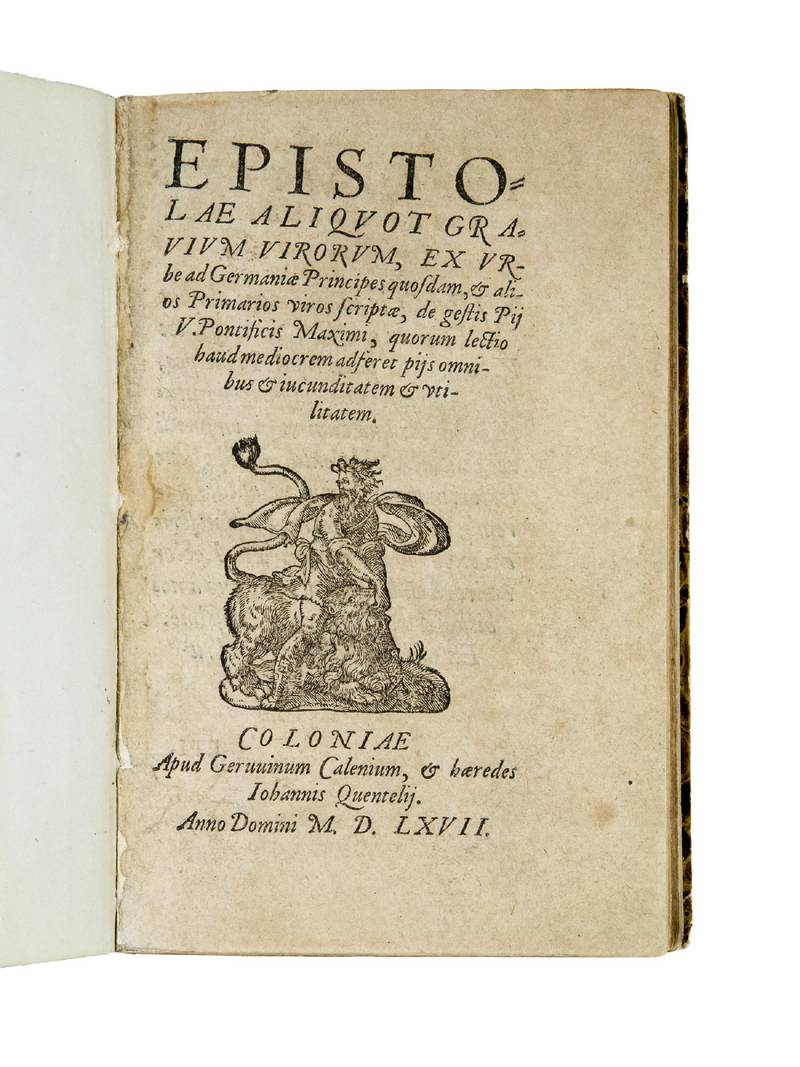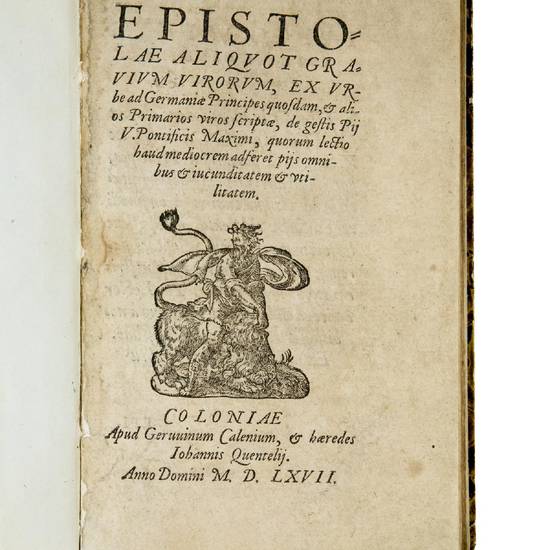Epistolae aliquot gravium virorum, ex Urbe ad Germaniae Principes quosdam, & alios Primarios viros scriptae, de gestis Pij V. Pontificis Maximi, quorum lectio haud mediocrem adferet pijs omnibus & iucunditatem & utilitatem
Autore: EISENGREIN, Martin, ed. (1535-1578)
Tipografo: Gervinus Calenius & Heirs of Johannes Quentel
Dati tipografici: Köln, 1567
8vo. 111, (1 blank) pp. a-g8. With the printer's device on the title-page. Half-cloth.
Adams, E-270; VD 16, E-807.
GREATLY ENLARGED EDITION of Eisengrein's collection of letters concerning the first two years of the pontificate of Pius V (Michele Gisleri, 1504-1572), with a new preface by the printer, Gervinus Calenius, dated Februry 28, 1567. An edition of only five letters had been published a year earlier under the title Nova fidedigna, de rebus, hoc anno, Romae a Rom. Pont. Pio Quinto gestis (cf. J. v. Pastor, History of the Popes, London, 1929, XVII, pp. 62 and 136).
The collection, which gathers letters or fragments of letters addressed by anonymous Germans living in Rome to German princes and notables, was later reprinted as a part of the biography of Pius V by Arcangelo Caraccia (Brevis enarratio gestorum sanctissimi pontificis Pii papae 5. ex processibus, et probatis auctoribus digesta, Roma, Guglielmo Faccioti, 1629). In the preface (p. XV) Caraccia states: “Qualia et quanta egerit in primo sui Pontificatus anno, ex quodam libello epistolarum Coloniae impresso Principibus Germaniae a quibusdam Germanis Romae commemorantibus scriptarum, liquido haberi possunt, quem ad verbum tanquam omnibus lectione dignum referre placuit”.
Michele Ghisleri was born at Bosco, near Alexandria (Lombardy). Being of a poor though noble family his lot would have been to follow a trade, but he was taken in by the Dominicans of Voghera, where he received a good education and was trained in the way of solid and austere piety. He entered the order, was ordained in 1528, and taught theology and philosophy for sixteen years. In the meantime he was master of novices and was on several occasions elected prior of different houses of his order in which he strove to develop the practice of the monastic virtues and spread the spirit of the holy founder. He himself was an example to all. He fasted, did penance, passed long hours of the night in meditation and prayer, traveled on foot without a cloak in deep silence, or only speaking to his companions of the things of God. In 1556 he was made bishop of Sutri by Paul IV. His zeal against heresy caused him to be selected as inquisitor of the faith in Milan and Lombardy, and in 1557 he was made a Cardinal and named inquisitor general for all Christendom.
In 1559 he was transferred to Mondovì, where he restored the purity of faith and discipline, gravely impaired by the wars of Piedmont. Frequently called to Rome, he displayed his unflinching zeal in all the affairs on which he was consulted. Thus he offered an insurmountable opposition to Pius IV when the latter wished to admit Ferdinando de' Medici, then only thirteen years old, into the Sacred College. Again it was he who defeated the project of Emperor Maximilian II to abolish ecclesiastical celibacy. On the death of Pius IV, he was elected pope, to the great joy of the whole Church.
He began his pontificate by giving large alms to the poor, instead of distributing his bounty at haphazard like his predecessors. As pontiff he practiced the virtues he had displayed as a monk and a bishop. In his charity he visited the hospitals, and sat by the bedside of the sick, consoling them and preparing them to die. He was very austere and banished luxury from his court, raised the standard of morality, laboured with his intimate friend, Carlo Borromeo, to reform the clergy, obliged his bishops to reside in their dioceses and the cardinals to lead lives of simplicity and piety. He diminished public scandals by relegating prostitutes to distant quarters, and he forbade bull fights. He enforced the observance of the discipline of the Council of Trent, reformed the Cistercians, and supported the missions of the New World. In the Bull "In Coena Domini" he proclaimed the traditional principles of the Roman Church and the supremacy of the Holy See over the civil power.
But the great thought and the constant preoccupation of his pontificate seems to have been the struggle against the Protestants and the Turks. In Germany he supported the Catholics oppressed by the ‘heretical' princes. In France he encouraged the League by his counsels and with pecuniary aid. In the Low Countries he supported Spain. In England, finally, he excommunicated Elizabeth, embraced the cause of Mary Stuart, and wrote to console her in prison. He supported the Knights of Malta, sent money for the fortification of the free towns of Italy, furnished monthly contributions to the Christians of Hungary, and endeavoured especially to bring Maximilian, Philip II, and Charles I together for the defence of Christendom. In 1567 for the same purpose he collected from all convents one-tenth of their revenues. In 1570 when Solyman II attacked Cyprus, threatening all Christianity in the West, he never rested till he united the forces of Venice, Spain and the Holy See. On the day of the Battle of Lepanto, October 7, 1571, he was working with the cardinals, when, suddenly, interrupting his work opening the window and looking at the sky, he cried out, "A truce to business; our great task at present is to thank God for the victory which He has just given the Christian army". He burst into tears when he heard of the victory, which dealt the Turkish power a blow from which it never recovered. He was hoping to put an end to the power of Islam by forming a general alliance of the Italian cities, Poland, France, and all Christian Europe, and had begun negotiations for this purpose when he died of gravel. He left the memory of a rare virtue and an unfailing and inflexible integrity. He was beatified by Clement X in 1672, and canonized by Clement XI in 1712 (cf. P.M. Jones, The Pope as Saint: Pius V in the Eyes of Sixtus V and Clement XI, in: “The Papacy Since 1500 from Italian Prince to Univeral Pastor”, J. Corkery & T.Worcester, eds., Cambridge, 2010, pp. 47-68).
Epistola I. A Germano quodam ex Urbe scripta ad quendam Illustriss. Principem [Truchsess Waldburg, Otto count to Hosius, Stanislaus]. Roma, February [16], 1566 (p. 3)
Epistola II. Ex Urbe missa ad quendam Germaniae Principem a Germano quodam. Roma, April 9, 1566 (p. 9)
Epistola III. Ex Urbe Ad N. Germanu(m) missa. Roma, April, 1566 (p. 21) (Caraccia, Ep. 3?)
Epistola IIII. Roma, May, 1566 (p. 26) (Caraccia, Ep. 4)
Epistola Quinta Romana, ad. N. Germanum ab amico missa. Roma, June, 1566 (p. 33) (Caraccia, Ep. 3)
Epistola VI. Roma, July 24, 1566 (p. 45)
Epistola Romana VII... scripta, N. Germano Praesuli. Roma, August 4, 1566 (p. 48) (Caraccia, Ep. 7)
Epistola VIII. Roma, September 23, 1566 (p. 55)
Epistola IX. Roma, October 21, 1566 (p. 62)
Epistola X. Roma, November 9, 1566 (p. 75)
(Quae sequuntur ex litteris ex Urbe ad Principem quendam Germanum datis sunt excerpta, ad mensem usque Januarium Anni 1567:)
Ex literis... Roma, March 25, [1566] (p. 78)
id. April 13, [1566] (p. 79)
id. May 15, [1566] (p. 81)
id. July 6, [1566] (p. 82)
id. July 20, [1566] (p. 83)
id. September 26, [1566] (p. 84)
id. October 12, [1566] (p. 85)
id. October 19, [1566] (p. 86)
id. October 26, [1566] (p. 87)
id. November 2, [1566] (p. 89)
id. November 9, [1566] (p. 94)
id. November 16, [1566] (p. 97)
id. November 30, [1566] (p. 98)
id. December 7, [1566] (p. 99)
id. December 2, [1566] (p. 100)
id. December 27, [1566] (p. 103)
id. January 4, 1567 (p. 106)
id. January 11, [1567] (p. 108)
id. January 18, [1567] (p. 108)
Martin Eisengrein was born of Protestant parents at Stuttgart. He studied humanities at the local Latin school, and liberal arts and philosophy at the University of Tübingen. To please his father, who was burgomaster of Stuttgart, Eisengrein matriculated as student of jurisprudence at the University of Ingolstadt, on May 25, 1553, but before a year had passed, he was at the University of Vienna, where he took the degree of Master of Arts in May in 1554.
During the tolerant rule of Ferdinand I, Eisengrein, though still a Protestant, became in 1555 professor of oratory and, two years later, of physics at the University of Vienna, a Catholic institution. Though, the Catholic surroundings and especially his frequent intercourse with the Jesuits of Vienna may have had great influence for his conversion to the Catholic faith in 1558. In 1559 he received a canonry at St. Stephen's in Vienna, and a year later he was ordained priest. In 1562 he went to the University of Ingolstadt where he had been invited by its superintendent, Frederick Staphylus. He was then appointed pastor of the church of Saint Maurice, which was incorporated with the university, and in April of the same year he was elected rector of the university.
Besides being professor, he devoted much of his time to the study of theology and, after receiving the degree of licentiate, he began to teach it in January 1564. Duke Albert V of Bavaria chose him as councillor, appointed him provost of the collegiate church of Moosburg, and shortly afterwards of the collegiate church of Altötting and the cathedral church of Passau. In 1563 and 1564 he took part in the politico-religious conferences at the imperial court of Vienna; in 1566 Duke Albert sent him to Pope Pius V to advocate the appointment of Prince Ernest as Prince-Bishop of Freising, and in 1568-9 he was imperial court chaplain at Vienna. In 1570 he was appointed superintendent of the University of Ingolstadt, and henceforth he turned his whole attention to the advancement of that university.
In the settlement of the differences between the Jesuits and non-Jesuit professors, Eisengrein always had the welfare of the university at heart. He publicly acknowledged the great efficiency of the Jesuits as educators in an oration which he delivered before the professors and students of the university on February 19, 1571, and he was pleased to see their influence gradually increase. There were, indeed, some differences between Eisengrein and theJesuits in 1572, but the estrangement was only temporary, as is apparent from the fact that he bequeathed 100 florins to the Jesuit library.
The greatest service which Eisengrein rendered the University of Ingolstadt was his organization of its library. It was owing to his efforts that the valuable private libraries of John Egolph, bishop of Augsburg, Thaddeus Eck, chancellor of Duke Albert, and Rudolph Clenek, professor of theology at Ingolstadt, were added to the university library. But Eisengrein's activities were not confined to the university. By numerous controversial sermons, some of which are masterpieces of oratory, he contributed not a little to the suppression of Lutheranism in Bavaria. Many of his sermons were published separately and collectively in German and Latin during his lifetime (cf. P.M. Soergel, Wondrous in His Saints: Counter-Reformation Propaganda in Bavaria, Berkeley, CA, 1993, pp. 105-130; see also L. Pfleger, Martin Eisengrein (1535-1578). Ein Lebensbild aus der Zeit der katholischen Restauration in Bayern, Freiburg/Br., 1908, passim).
[9159]





